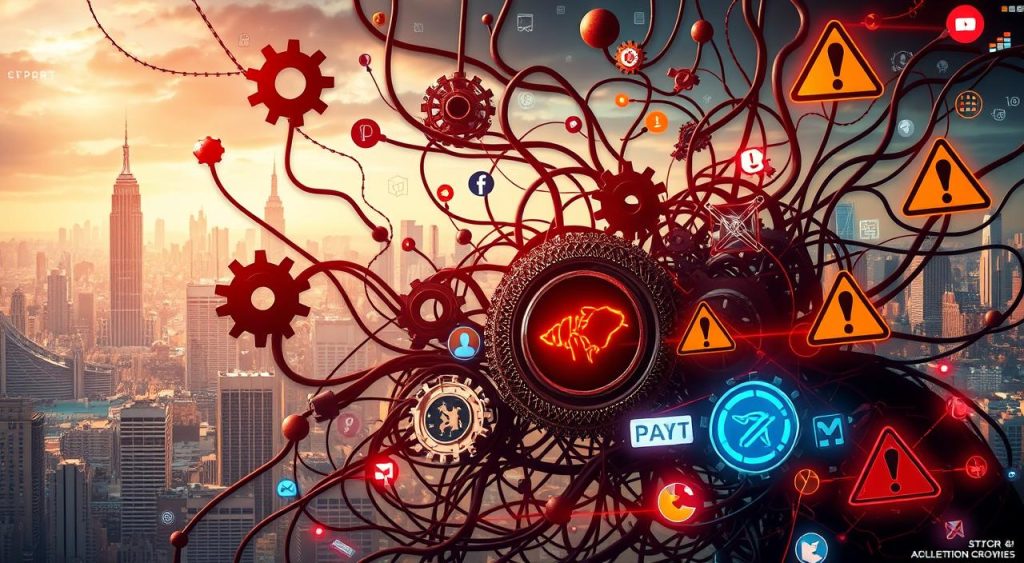Have you ever felt the rush of possibilities when you unlock technology’s potential? Today’s fast-paced digital world has merged creativity with artificial intelligence (AI). This has changed how agencies work.
As you aim to improve your strategies and grow, knowing about AI marketing tools is key. Big names like Google, IBM, and Airbnb are using these tools. They’re changing how they connect with customers and get better results.
Choosing the best AI marketing software is crucial. It’s not just a trend; it’s necessary to keep up in a market that’s always changing. Eighty-three percent of executives see AI as a key strategy for their businesses. Now is the time to see how AI can change your marketing and lead to success.
Introduction to AI in Marketing
AI is changing marketing by using machine learning, natural language processing, and data analytics. These innovative AI tools for marketing agencies help marketers understand what customers want better. This makes it easier for brands to reach out to their audience.
About 68% of marketers use AI every day, mainly for making things more personal and achieving other goals. More businesses are using AI, and 54% say it has helped them save money and work more efficiently.
Also, 80% of marketers now use AI in their plans, showing how important it is in marketing today. This tech makes work better and makes customers happier, with 80% of those who’ve used AI software saying it was good. Marketers can use AI to make their work easier and their campaigns more focused, which can increase customer interest by up to 80%.
AI is making a big difference in how marketing agencies work. It can look at lots of data and guess what people might do next. This makes AI very useful. For example, 83% of marketing leaders want to use AI to make their work more profitable. As AI gets better, it will likely change marketing even more.
What Are AI Marketing Tools for Agencies?
AI marketing tools are advanced software that helps with marketing tasks. They use new technologies to give insights from lots of data. This makes marketing work better. Agencies use these tools to do more with less time on routine tasks.
These tools include chatbots for customer help, tools for making content, and analytics for understanding customers. For example, chatbots can help customers anytime, making them happier. Also, using AI for understanding audiences helps make content more personal, which leads to better engagement.
AI tools help teams by automating tasks, giving more time for strategy. They make work more efficient, helping marketing teams do better.
| Tool | Functionality | Pricing |
|---|---|---|
| DALL·E | Image generation | $20/month |
| Adobe Photoshop | Generative design features | From $19.99/month |
| Descript | Video editing and transcription | From $12/user/month |
| CallRail | Conversation analytics | Starting at $90/month |
| Synthesia | Video generation | From $18/month |
Agencies need to keep up with the digital world, leading to more AI tool use. As more companies see AI’s benefits, using these tools will grow.
Key Benefits of AI Marketing Tools
Using top AI tools for digital agencies can change how marketing works. It makes handling big campaigns easier, which means you can do more with less. AI also cuts down on costs by automating simple tasks, so teams can do more without needing more people.
AI makes things run smoother and faster, which means products and campaigns get to market quicker.
AI helps manage digital assets, saving a lot of time. It also gives insights on how people interact with content, helping marketers make better choices. Plus, AI makes reports automatically, freeing up hours that would be spent on them manually.
AI is great at predicting what customers might want next, making campaigns better. It can also make decisions up to five times faster, and make ads more personal, boosting conversion rates by 20-30%. Chatbots and virtual assistants cut response times in half, making customers happier.
Adding AI to your marketing tech can really boost productivity and efficiency. Companies using these tools see click-through rates jump from 3% to over 10% in some areas. This means marketing teams can grow without having to hire more people, saving on costs. The rise of AI in digital marketing shows just how valuable it is.
Top AI-Powered Marketing Tools to Consider
Looking into the best AI marketing software shows a wide range of tools. Each has special features to meet your agency’s needs. For example, Jasper has over 50 templates for different marketing needs, making copywriting easier. It has over 350,000 users and 5,000 five-star reviews, showing it’s a top choice for content creation.
Surfer SEO is great for improving content for search engines. It helps big names like FedEx and Shopify rank better online. It focuses a lot on content optimization, making it a go-to for boosting online presence. On the other hand, AdCreative.ai is all about making top-notch ads. It uses AI to create ads that can really boost your campaigns.
Salesforce Einstein AI uses AI to understand customer behavior. It helps make better decisions and keeps customers from leaving. Tools like Tidio, starting at $29 a month, also help by improving how you talk to customers with AI.
Using AI in marketing is becoming more common. Businesses see their work flow improve a lot, thanks to less manual work. As things change, using AI marketing tools is key. It helps businesses stay ahead and understand the market better.

| Tool | Primary Functionality | Highlights | Starting Price |
|---|---|---|---|
| Jasper | Copywriting | Over 50 templates, acclaimed by 350,000+ users | Not Specified |
| Surfer SEO | Content Optimization | Used by brands like FedEx; enhances search rankings | Not Specified |
| AdCreative.ai | Ad Generation | Dynamic automated ad creation | Not Specified |
| Salesforce Einstein AI | Predictive Analytics | Machine learning to prevent churn | Not Specified |
| Tidio | Customer Interaction | AI-powered tools for conversion rate optimization | $29/month |
AI Marketing Tools for Agencies: Enhancing Content Creation
In the fast-changing world of digital marketing, AI tools are key for agencies. They make content creation faster and better. A survey showed that 300 agencies found these tools helpful, but also faced challenges.
AI tools help marketers come up with new ideas. They can suggest “20 B2B pain points” or “50 campaign ideas.” This sparks creativity and helps connect with audiences. It also frees up time for more important tasks like planning and analysis.
In 2023, AI tools have made content creation much quicker. Tasks that took days now take hours. This is thanks to AI’s ability to reduce errors and improve content quality. For example, Grammarly has found over 97,934 errors in content, helping businesses save time and money.
Tools like ChatGPT and SurferSEO make content creation easier. ChatGPT starts at $20 a month and helps generate ideas fast. SurferSEO is an AI writing assistant and SEO tool. These tools help create targeted campaigns, increasing ROI and customer engagement.
AI tools also help find new audience segments. This expands market reach. Repurposing content with AI saves time and boosts campaign success by reaching more people.
| AI Tool | Monthly Cost | Features |
|---|---|---|
| ChatGPT Plus | $20 | Generates creative content and aids in brainstorming |
| Grammarly | Free (up to 100 AI prompts) or upgraded plans available | Error correction and writing enhancement |
| SurferSEO | Varies | Keyword research and content optimization |
| Jasper | $59 | AI content generation with various templates |
| Copy.ai | $36 (unlimited access) | Creative writing and copy generation |
Streamlining Processes with AI Marketing Automation
In today’s fast world, using AI in marketing is key for success. It changes how teams work, moving from old ways to new, flexible ones that meet customer needs. AI helps by doing routine tasks, making campaigns better, and improving how we talk to customers.

Tools like Numerous.ai make teamwork easy, without needing hard API keys. It lets users make SEO content and AdWords keywords easily. It also sorts and categorizes content, so marketers can focus on big ideas, not small tasks.
More and more businesses are using AI in their marketing plans, with 25% aiming to by 2024. AI helps with tasks like scoring leads and suggesting content, making work better and clients happier. It also uses big data to guess what customers will want, helping to make marketing better on the fly.
AI watches campaigns all day, helping businesses get more from their ads and customers. This smart way of working cuts down on manual work and lets marketers create content just for each customer, leading to more sales.
AI-Driven Analytics and Reporting Tools
In the world of data-driven marketing strategies, AI tools are key. They make analyzing campaign results faster and more accurate. This means less chance of mistakes and less bias in data. They also help see how different campaigns perform together, making analysis easier across platforms.
This is crucial for making better business decisions and improving marketing success. It’s important in a competitive market.
AI has a big impact on analytics. Companies using AI can get insights from big data faster than before. This quick data processing helps marketers improve their campaigns quickly. For example, Google Analytics now has features like predicting customer churn, helping with decision-making. HubSpot’s AI tools automate workflows, making work easier and more productive at any business size.
Here’s a table showing some popular AI analytics tools and what they offer:
| Tool | Key Features | Pricing |
|---|---|---|
| AgencyAnalytics | AI report summarization | Starts at $150/month; free 14-day trial |
| Google Analytics 360 | Cross-platform tracking | Starting around $50,000/year |
| HubSpot | Predictive analytics | From $15/month to $3,600/month |
| Zoho Analytics | Natural language queries | Contact for pricing |
| Optmyzr | PPC data analysis | Starts at $249/month; free 2-week trial |
These AI tools are made for efficiency and to help agencies with data-driven marketing strategies. They make agencies more effective in their work.
Personalization and Customer Engagement through AI
Personalization is key for engaging customers today. People want experiences tailored just for them. In fact, 79% of consumers are ready to share their data for personalized experiences. Also, 63% expect personalization as standard, making generic campaigns less effective.
AI tools use advanced algorithms to segment customers and tailor messages. They predict what customers might do next. This leads to messages that really speak to them. Companies using AI see a 30% boost in keeping customers.
For example, personalized emails can engage customers 29% more than usual emails. AI helps plan seasonal campaigns by adapting to trends in real-time. This improves decision-making.
Dynamic website content personalization can boost conversion rates by over 20%. This shows AI’s value in engaging customers. Also, 80% of customers are more likely to buy when they feel seen by a brand.

Lastly, personalized loyalty programs can increase retention by up to 35%. This highlights the need for AI in marketing to meet today’s data-driven consumers.
Integrating AI Tools into Your Marketing Stack
Adding AI marketing tools to your current stack can boost your productivity and results. Start slow to let your team get used to the new tech. This way, you can show clear benefits that will encourage more use across your team.
AI can make tasks like data analysis and content tweaking easier. This lets your team spend more time on creative and strategic work. For example, AI can help pick the best media for your campaigns, making your marketing more effective.
Generative AI tools speed up content making and keep your brand’s voice consistent. They help with quick idea generation and checking grammar and readability. Also, conversational AI makes customer chats more personal, building trust and keeping customers.
Using AI tools all together can make your marketing work more efficient. It automates tasks like email campaigns and reports. This saves money and lets your team focus on important tasks and talking to customers.
It’s important to keep your AI data quality high. Good data makes AI outputs better. Following ethical data use rules helps build trust in your AI tools.
| Integration Strategy | Description | Benefits |
|---|---|---|
| Start Small | Begin with a focused pilot project. | Manages learning curve; demonstrates measurable results. |
| Automate Activities | Utilize AI to automate repetitive tasks. | Increases efficiency; reduces operational costs. |
| Focus on Quality Data | Maintain and audit input data rigorously. | Enhances AI outputs; builds trust. |
| Encourage Creativity | Use AI tools to foster, not replace, creative processes. | Promotes innovation and strategic thinking. |
Challenges and Limitations of AI Marketing Tools
AI marketing tools bring new ideas, but they face challenges. Many people worry about how companies use their personal data, with about 63% of consumers concerned. This shows we need to be open about how we handle data, following rules like GDPR since 2018.
Most people prefer talking to humans for complex issues, with about 70% of consumers choosing human interaction. This highlights the limitations of AI in marketing, where personal touch matters a lot.
Starting to use AI can be expensive, with costs possibly rising by 30% for training and setup. Also, using AI well depends on good data, as bad data can reduce its effectiveness by 25%. About 50% of agencies are using AI, but only 25% are using it fully.
AI can have biases, causing ethical problems for about 30% of marketers. About 80% of AI systems might inherit biases from their training data, making AI decisions unfair.
It’s important to keep an eye on how AI is doing, as those who do see a 20% better ROI. As people learn more about their data rights, there’s a push for ethical data use, affecting how AI is used.

To tackle these issues, we need to invest in quality data, have humans check important steps, and be open with customers. By doing this, we can make AI marketing tools better and more effective.
| Challenge | Impact | Statistics |
|---|---|---|
| Data Privacy Concerns | Consumer trust and transparency | 63% of consumers are concerned about data use |
| Preference for Human Interaction | Retention during complex interactions | 70% prefer human communication |
| Implementation Complexity | Initial financial burden | Up to 30% cost increase |
| Data Quality | Effectiveness reduction | 25% decrease in AI performance |
| Bias in AI Algorithms | Ethical implications | 30% face biased outcomes |
| Performance Monitoring | ROI improvement | 20% increase with monitoring |
Future Trends in AI Marketing Technologies
The future of AI marketing tools is set to change a lot. By 2025, 35% of content creators will use generative AI to make content on the fly. This could make audience engagement much better than before. Also, 62% of marketers think AI will help make big marketing decisions, leading to better campaigns and use of resources.
New tech like predictive analytics will help make marketing more personal. By 2025, AI chatbots might handle up to 85% of customer chats without humans. This big change will alter how we talk to customers.
Video production tools driven by AI are also expected to grow by 50% in 2025. Brands will make more personalized videos, meeting the demand for engaging videos. Gen-Z likes short, interactive videos, so brands will need to adapt.
Virtual influencers will also become more popular, with 48% of brands using them for interactive engagement. AI personalities will help connect with audiences better. Plus, AI budgets in marketing will rise by 40% by 2025, showing AI’s growing role in marketing.
As people’s needs change, so will marketing strategies. 55% of consumers value their online privacy, wanting “privacy-first personalization” to build trust. With laws in 127 countries about AI, ethics will guide these new tools.
| Trend | Impact | Projections for 2025 |
|---|---|---|
| Generative AI Usage | Improved content engagement | 35% of content creators will use it |
| AI Chatbots | Enhanced customer interaction | 85% of interactions managed by AI |
| AI-Driven Video Tools | Higher personalized content production | 50% market growth |
| Privacy-First Personalization | Increased consumer trust | 55% prioritize online privacy |
| Budget Allocation for AI | Strategic marketing innovation | 40% budget increase |
Conclusion
AI marketing tools are key for agencies, making operations smoother and improving results. They cut down task times from days to hours. They also help make decisions with data insights.
As agencies use AI more, they can grow without needing to hire more people. This is a big win in today’s fast-paced world.
AI does more than just speed things up; it also makes talking to clients better. AI helps create marketing plans that really work. For example, AI can make emails that get opened a lot more, boosting engagement by up to 200%.
Tools like AdCreative.ai can really boost your marketing. It’s important to keep up with these new technologies.
When looking at AI tools, find ones that fit well with your marketing setup. Using strong AI strategies helps your agency succeed and deliver great results for clients. It’s about leading in marketing, not just keeping up.

